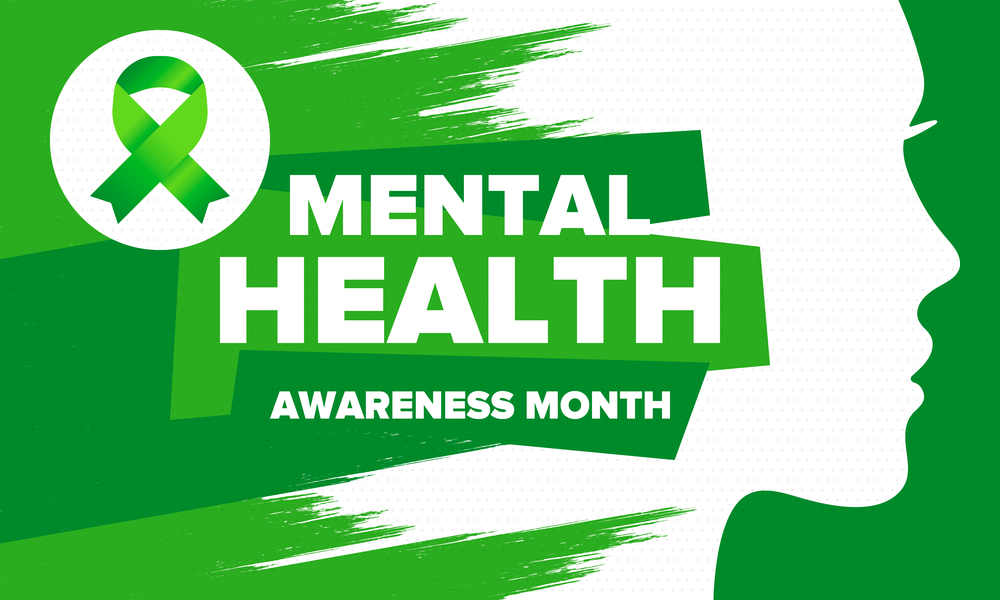May is Mental Health Awareness Month, dedicated to raising awareness, reducing stigma, and seeking help for ourselves or our loved ones.
Updated March 2024
As we pass the two-year mark of the pandemic, we can all agree that it’s been a tough time – particularly for anyone who faced illness or the death of a loved one. For people who struggle with mental health issues, the isolation, anxiety, and loss of normal routines exacerbated existing problems. But life hasn’t been easy for any of us and just when we should all be starting to resume normal life, we face even more challenges: rising prices, inflation, and a war in Ukraine. It’s a lot to cope with, and for many, it’s just too much. How are you doing? How are your loved ones doing? It might be time to take a self-inventory to see if you or a loved one could benefit by help for our mental health.
Most of us are quick to seek help when we face physical ailments that cause us pain or interfere with our lives, but when it comes to mental health, things get complicated. People think they can handle the problems themselves or try to relieve the pain or stress with unhealthy behaviors such as drug or alcohol use. Sometimes people are the last to know they have a problem that is apparent to loved ones and they need intervention to get help. Often, common myths and misconceptions about mental illness stand in the way of getting needed help.
May is Mental Health Awareness Month
Mental health problems are more common that most people think, often because we don’t talk about them or hide them away for fear of stigma. According to MentalHealth.gov, as of 2020:
- One in five American adults experienced a mental health issue
- One in 6 young people experienced a major depressive episode
- One in 20 Americans lived with a serious mental illness, such as schizophrenia, bipolar disorder, or major depression
- Suicide was the 2nd leading cause of death for people ages 10-24.
The month of May is dedicated to raising awareness, educating ourselves, and reducing the stigma associated with mental illness.
Among the many resources available from the National Alliance of Mental Illness (NAMI) is a list of signs and symptoms that should be an alert to seek help. They note that each illness has its own symptoms, but common signs of mental illness in adults and adolescents can include the following:
- Excessive worrying or fear
- Feeling excessively sad or low
- Confused thinking or problems concentrating and learning
- Extreme mood changes, including uncontrollable “highs” or feelings of euphoria
- Prolonged or strong feelings of irritability or anger
- Avoiding friends and social activities
- Difficulties understanding or relating to other people
- Changes in sleeping habits or feeling tired and low energy
- Changes in eating habits such as increased hunger or lack of appetite
- Changes in sex drive
- Difficulty perceiving reality (delusions or hallucinations, in which a person experiences and senses things that don’t exist in objective reality)
- Inability to perceive changes in one’s own feelings, behavior or personality (”lack of insight” or anosognosia)
- Overuse of substances like alcohol or drugs
- Multiple physical ailments without obvious causes (such as headaches, stomach aches, vague and ongoing “aches and pains”)
- Thinking about suicide
- Inability to carry out daily activities or handle daily problems and stress
- An intense fear of weight gain or concern with appearance
See more on Warning Signs and Symptoms that point to a need to reach out for help. Also, see our post on Mental Health and Depression Awareness for signs specific to depression.
Getting help for your mental health
Help is available for mental illnesses and it can be highly effective in providing relief. Depression and other mental health illnesses don’t have to be unbearable if you reach out to get help. If you or a family member is suffering from depression or any other mental health issue, why not get help?
If you are a Member of ESI EAP, learn more about the excellent counseling services available to you and your family 24 hours a day, 7 days a week, 365 days a year. In addition to telephonic in-the-moment counseling, you can access telehealth and video and counseling, coaching and training programs to help you address any underlying issues causing stress or problems, and a comprehensive self-help center with 25,000+ resources.
Whether or not you are an member of ESI EAP, here are other resources that may help.
- NAMI – Find help and support for individuals with mental illness; family members and caregivers; teens & young adults; veterans & active duty; and front-line professional.
- Mental Health America – The nation’s leading community-based nonprofit dedicated to addressing the needs of those living with mental illness and to promoting the overall mental health of all Americans. Access a wide variety of education and help tools including DIY tools and Mental Health Screenings.
- National Suicide Prevention Lifeline – The Lifeline provides 24/7, free and confidential support for people in distress, prevention and crisis resources for you or your loved ones, and best practices for professionals. 1-800-273-8255.
- Right Direction – When you feel lost, life can seem overwhelming. But where there’s hope, support, and resources, you can find your way. This site from the American Psychiatric Association Foundation offers tools and resources for both employees and employers.
- HelpGuide – Independent, not-for-profit site with a mission of providing empowering, evidence-based information you can use to help yourself and your loved ones improve mental health and make healthy changes.
- Emotional Wellness Toolkit – From the National Institutes of Health offers 6 strategies for improving your emotional health.

